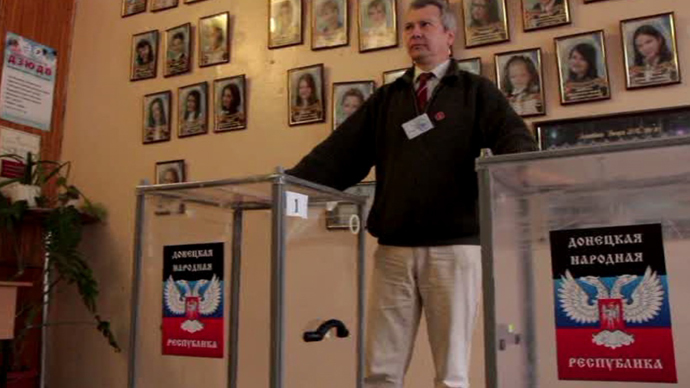
‘Respect’: Russia’s De Facto Recognition of Secession in Ukraine’s East
Publication: Eurasia Daily Monitor Volume: 11 Issue: 202
By:

The European Union’s new High Representative for Foreign and Security Policy, Federica Mogherini, and German Chancellor Angela Merkel’s chief spokesman, Steffen Seibert, among many other European officials, have characterized the secessionist “elections” just held in Ukraine’s Donbas (eastern Ukrainian region encompassing Donetsk and Luhansk provinces) as illegal and illegitimate. However, they seemed somewhat mystified by Russia’s official position regarding those “elections.” Russia has sponsored those elections in every sense, but it stops short of “recognizing” their results for the time being. Instead, Russia merely “respects” those results and the “expression of will” therein.
“It is incomprehensible that Russia officially voices respect or recognizes those ‘elections’,” Seibert commented, inadvertently blurring the distinction between those two terms (bundeskanzlerin.de, November 7). Mogherini, on the contrary, overemphasized the distinction: “Russia is talking about ‘respect,’ not about ‘recognition.’ This means that we [the EU] have some space for maneuver” (La Stampa, Sueddeutsche Zeitung, November 4).
The space for maneuver, however, is mainly Russia’s. Between recognition and respect, Moscow draws a distinction without a real difference. Russia’s direct military intervention has enabled its local proxies to secede from Ukraine de facto.
Russia aims to legitimize the Donetsk and Luhansk “people’s republics” with electoral mandates (“respecting the voters’ will”). On that basis, Moscow seeks to develop direct relations between Russia and the “DPR-LPR,” treating these de facto as legitimate, and practically voiding Ukraine’s sovereignty there. Russia also wishes to raise those “elected” authorities to equivalence with Ukraine’s government in negotiations. And finally, Moscow tries to achieve all those results short of “recognizing” the two “republics,” while these are fronting for Russia.
Hiding Russia’s hand in these ways could avoid additional rounds of Western economic sanctions. It is in this limited sense that Western sanctions-skeptics (of whom Mogherini is one) see “some space for maneuver.”
Moscow’s position “respecting,” rather than recognizing outright, the election or referendum results in secessionist territories, has surprised many observers in the wake of the “DPR-LPR” elections. Russia, however, has already applied similar tactics with regard to the secession referendums in Crimea in March, and in Donetsk and Luhansk in May, all of which Russia “respected,” short of formal recognition. This seems to have been quickly forgotten, or at least is not serving as a point of reference and comparison with the current developments in Donbas.
On March 6, the local Crimean parliament scheduled a referendum for March 16. On March 7, the Kremlin announced (seemingly in a noncommittal manner) that Russia would “respect that referendum’s results.” On March 16, Russian President Vladimir Putin informed U.S. President Barack Obama and other Western leaders that Crimea had voted that day for joining Russia, and that Moscow would “respect the voters’ choice.” On March 17, Moscow advanced from “respect” to official recognition of Crimea’s separation from Ukraine. On March 18, Putin and secessionist leaders signed the treaty on Crimea’s annexation to Russia. In this case, Russia felt confident enough to telescope the process, deviating from its usual incrementalism (see EDM, March 14, 17, 19).
Moscow used a different stratagem in Donbas. The “DPR” and “LPR” leaders declared “independence” from Ukraine on May 10, when Russian military and paramilitary control had reached its maximum territorial extent in the region. On May 11, the two “people’s republics” staged “referendums” approving that declaration. Russian President Vladimir Putin, Foreign Affairs Minister Sergei Lavrov, and Russian parliamentary leaders stopped short of “recognizing” the “independence.” Instead, they took the position that “the will expressed by the population deserves to be respected.”
Compounding the ambiguity, the referendum-approved term was “samostoyatelnost,” implying less than nezavisimost (which would have been full independence). The chosen term was consistent with a concept of sovereignty whereby most local laws would take precedence over the legislation of a federalized or confederalized Ukraine. However, samostoyatelnost could also be interpreted as a basis for subsequent secession from Ukraine.
“DPR-LPR” authorities and Moscow took the position that a broad “mandate” by referendum was more important than any specific way of implementing it. They would, instead, take their time and use these “mandates” for bargaining leverage against the Ukrainian government. Federalization, confederalization, merger into a South-Eastern Ukraine or a Novorossiya entity, full secession from Ukraine, outright accession to the Russian Federation—all these options could be presented eventually as flowing from those “referendums” (see EDM, May 9, 14).
Moscow had not yet determined its options at that stage, and seems to be considering all these hypothetical scenarios to date. Russia would almost certainly adopt an incremental approach to any political and military scenario. The risks of incurring additional Western economic sanctions constrain Russia’s military options to a significant extent, but not entirely. Politically, Moscow’s short-term priority remains that of legitimizing the Donetsk-Luhansk “republics” on par with Kyiv in conflict-resolution negotiations. Moscow seeks the soonest resumption of Contact Group negotiations, with official participation of “DPR-LPR” representatives appointed by the recently “elected” leaders (Interfax, November 11).
Russia is positioning itself as mediator in these negotiations, so as to maximize its leverage on Kyiv. Were Russia to recognize those two “republics,” it would automatically forfeit the mediator’s role and leverage. Hence, Moscow pretends to merely “respect the choice of the two republics’ voters.” Meanwhile it treats their leaderships as legitimate and provides them with full-fledged military support.
This year, Russia crossed the threshold from “respect” to “recognition” in about two weeks in Crimea’s case (see above); but it took some 16 years to cross a similar type of threshold in Abkhazia and South Ossetia (1992–2008); and Moscow has not crossed it officially in Transnistria’s case from the early 1990s to date. At this point, for the short term at least, Russia is interested in conserving the conflict in Ukraine’s Donbas.




